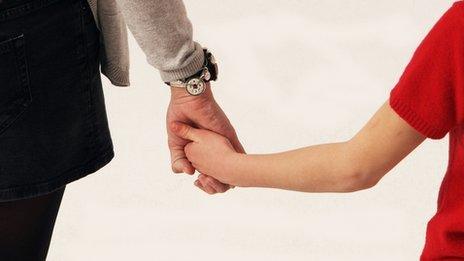Wales' LGBT community urged to adopt and foster children
- Published
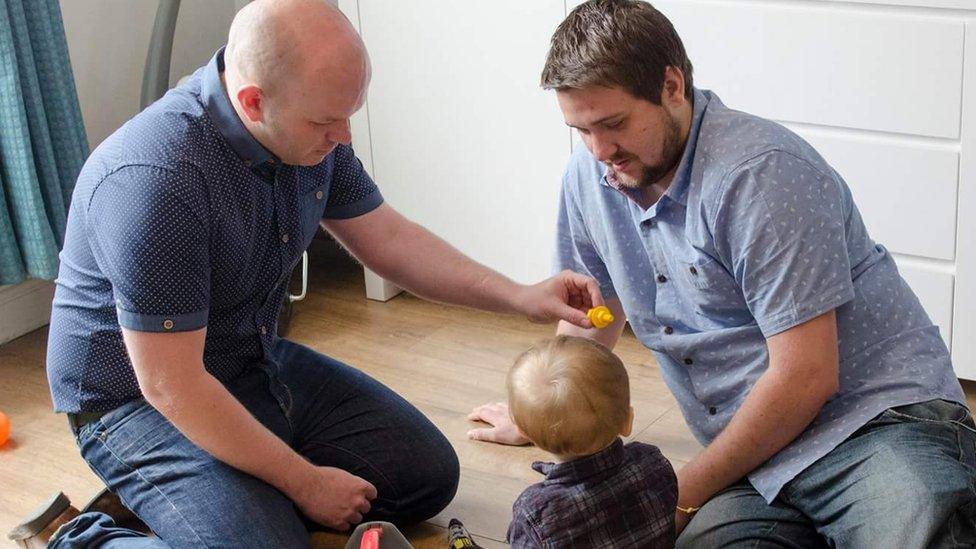
Graham and Tyrone Williams with their son Ollie
Becoming fathers has made Tyrone and Graham Williams's lives complete.
The Pontypridd couple are one of 90 gay or lesbian families to have adopted in Wales over the past 10 years.
The adoption of son Ollie, three, has been so successful, they have since fostered twice, and are now looking after a teenage boy with autism.
"From my early 20s, I knew I wanted to have a child and have a family," said Tyrone.
"Fostering and adoption made me realise it is achievable. It's been fantastic. It's made my dreams come true."
According to the Fostering Network, external, there is an urgent need for 500 foster families across Wales. And on the 10th anniversary of the law changing to allow same sex couples to adopt, the lesbian, gay, bisexual and transgender (LGBT) community is being urged to fill the gap.
Last year, there were 30 adoptions by same-sex couples, external across Wales, a six-fold increase since 2011.
Campaigners, charities and councils welcome the figures. But, they say, there is still a long way to go to tackle misconceptions from both within society and the LGBT community.
According to a 2013 survey by equality charity Stonewall, 80% of LGBT people would expect to face barriers if they applied to become foster parents. Almost half would expect to be treated worse than heterosexual people if they wanted to adopt.
In fact, anyone over 21 who has a spare room can adopt or foster.
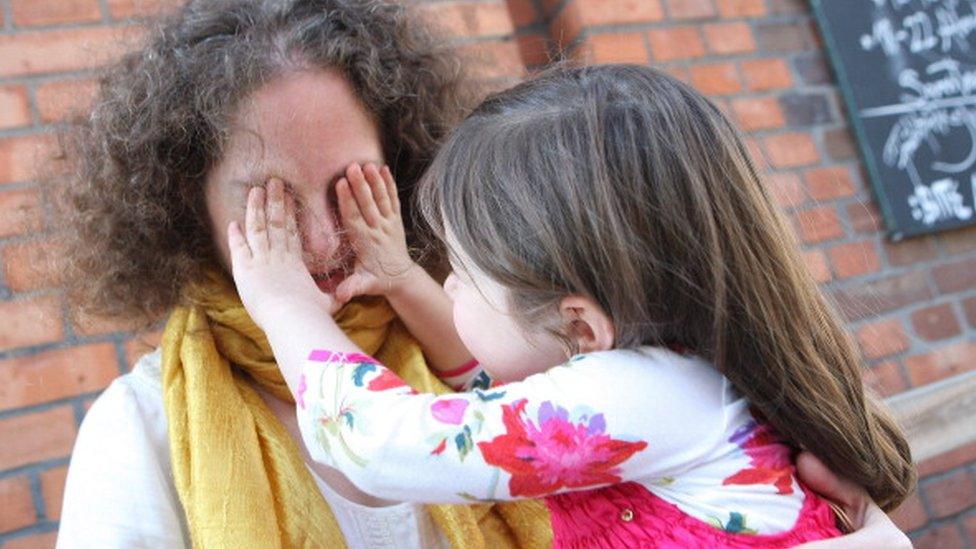
"A lot of same-sex couples grew up in a time when same-sex adoption and fostering wasn't common, or was outlawed. So you have generations of stigma. When I came out, I had to accept that I would never become a dad," said Andrew White, director of Stonewall Cymru.
Mr White and his husband adopted their son, now six, in 2012 - an experience he describes as "the biggest privilege, challenge and joy" of his life.
"It's extraordinary to be so ordinary," he said.
"If you have any questions about becoming a family and think it's possible, pick up a phone and learn as much as you can. There are so many children in need of forever families. And it's absolutely vital that every child gets the best chance."
But, he says, there is still a level of cultural prejudice.
"I've yet to meet one same-sex couple who, on approval, weren't asked about whether their child will be bullied. Yes, it may be a issue - but would they ask a mixed race or older couple?
"It's something new for LGBT people to get used to. And its comparatively new for adoption agencies too."
Accepting society
The charity New Family Social, external was formed in 2007 to support LGBT adopters and foster carers. It organises the LGBT adoption and fostering week, external, which holds advice and support events across Wales, external from 7 March every year.
"In an ideal world, there wouldn't be a need for an LGBT adoption and fostering week," admitted New Family Social spokesman James Lawrence.
He says that schools are better equipped than ever to protect children of LGBT parents from bullying and the greater visibility of LGBT families means society has become more accepting. But, he warns, there is work to be done.
"The research is quite a stark reminder that there is a huge expectation of discrimination. And although the adoption stats are encouraging, it doesn't mean we should be complacent."
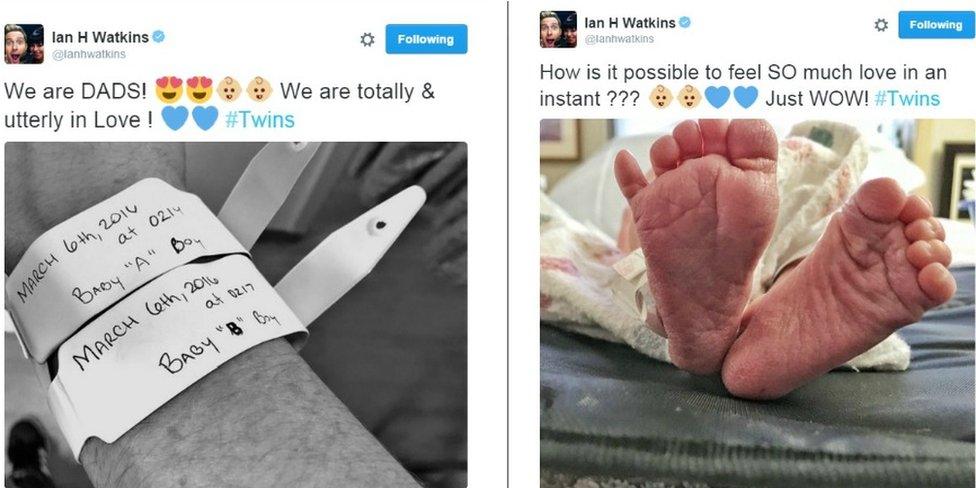
Ex-Steps singer Ian "H" Watkins is loving being a father
For Tyrone, 29, and Graham, 35, potential stigma was a concern. But, they say, the adoption and fostering processes could not have been easier.
"The only time my sexuality was raised was when I first called and was asked for my wife's name," Graham, a South Wales Police officer, said. "We also talked to another same-sex couple at the information evening."
Ollie settled into his family with the help of a personalised photo story book and DVD, explaining his new family and how it worked, using teddy bears with his parents' names.
"We are from the valleys; you would think there would be old ways of thinking about traditional families," Tyrone, a former special needs teaching assistant, said. "We do get questions from people. But we haven't come across anything negative. We are not a traditional family. But we hope we become traditional."
For many same-sex couples, surrogacy is a popular route to parenthood. Steps singer Ian "H" Watkins, from Cwmparc, Rhondda Cynon Taff, and partner Craig Ryder recently became parents to twins born to a surrogate mother.
'Bullied'
Tyrone and Graham instead decided to help children who already needed a family.
Carers like the Williams family are in huge demand across Rhondda Cynon Taff. The county wants to recruit 150 foster families and has a shortage of carers for children aged eight and over.
"If we could clone Graham and Tyrone, every child in Rhondda Cynon Taff would have a safe, supportive foster home for as long as they need it," a council fostering team spokesman said.
For many, LGBT foster and adoptive carers have exactly the kinds of qualities needed to take on the responsibility of a looked after child.
"As a community we have experience of being bullied or being made to feel different. In the journey of adoption, those are good experiences to enable you to empathise with your child," Mr White said.
A weekly allowance that pays for foster children's day-to-day needs, set at a minimum of £166 across Wales, external, has now enabled Tyrone to become a full-time father and carer.
It is the beginning of a journey he hopes will see his growing family give more children a loving home.
"I would encourage any family to go to training," he said.
"You can foster on weekends and there are so different ways of giving support to children who need care. There are no barriers."
- Published5 March 2013
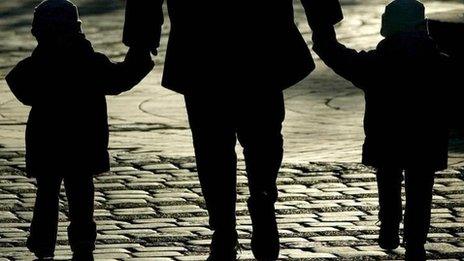
- Published21 February 2012
